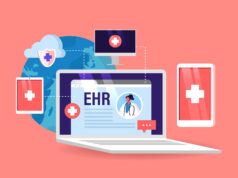
From left, MedCity News’ editor-in-chief, Arundhati Parmar, moderates the panel “AI Comes of Age During Covid” with Tom Richards, senior vice president and global lead for strategy and business development at Cigna; Rajarshi Banerjee, CEO at Perspectum; Dr. Sarah Friedewald, vice chair of operations in the department of radiology and chief of breast imaging at Northwestern Medicine; and David Rhew, global chief medical officer and vice president of healthcare for Microsoft.
The spike in telehealth use at the outset of Covid-19 pandemic garnered much attention, and for good reason. But another technological revolution may also be gaining traction in healthcare, where AI hype is giving way to an ever-increasing number of real-world applications.
“During the pandemic, all of us have seen an explosion in the adoption of virtual health,” said David Rhew, global chief medical officer and vice president of healthcare for Microsoft at MedCity INVEST in Chicago on Tuesday. “But during that time we’ve also seen a lot of highly innovative approaches towards the use of artificial intelligence to improve decision-making, to allow us to become much more predictive and also to improve clinical workflows,” said Rhew, in a panel discussion about AI’s adoption.
Others on the panel—which was moderated by MedCity News’ editor-in-chief, Arundhati Parmar—concurred.
AI is increasingly playing a bigger part in healthcare, and it’s not the stuff of science fiction, where robots replace people—or more specifically doctors. Instead, AI and machine learning are growing into a more dynamic, supportive role that helps health providers improve outcomes for patients and reduces workload for clinical staff.
“We have developed AI decision support tools to help with diagnosing patients with a variety of diseases, whether it’s liver disease or Covid,” said Rajarshi Banerjee, CEO at Perspectum, which is headquartered in Oxford, England.
It’s not about whether AI has a place in healthcare, but what its functions will be, the panelists said. “With that in mind, we should configure how we want to use artificial intelligence rather than battle against it,” Banerjee said.
Among the growing number of applications for AI in healthcare, is its use in symptom checkers. In particular, Tom Richards, senior vice president and global lead for strategy and business development at Cigna, noted that his company had invested in Buoy Health in 2020. “We worked with them to develop a symptom checker that was Covid-specific,” he said.
The AI-powered symptom checker was quickly developed and deployed and has been used by hundreds of thousands, most who found they didn’t need to seek immediate care. “It added tremendous value,” Richards said. For those who did require medical attention, they were triaged to ensure they got the right care, he added.
Research is also underway to see if AI could be used to more effectively and efficiently use mammography to screen for breast cancer, explained Dr. Sarah Friedewald, vice chair of operations in the department of radiology and chief of breast imaging at Northwestern Medicine.
“One of the greatest criticisms of mammography is the low sensitivity and the anxiety associated with having to come back for additional imaging that may not end up being cancer,” Friedewald said. “That actually prevents patients from coming in and getting screened because they don’t want to go through that anxiety.”
But it isn’t only direct clinical applications where AI may improve healthcare. It’s also being used to help tackle more mundane, administrative tasks to lessen those burdens and leave more time for face-to-face doctor-patient interaction.
“Taking unnecessary waste out of the system including administrative tasks that don’t need to be done or can be done more efficiently is definitely an important use case,” Richards said.
He noted that Cigna uses AI to handle millions of prior authorizations, and that most are able to be approved automatically.
Whatever AI might be used for today or tomorrow, panelists emphasized the assistive role technology can play to help improve patient outcomes and reduce the workload for health providers who are already stretched thin.
“It reduces some of the human burden,” Richards said.








